except和besides的区别
except,beside,apart from,in addition(to)
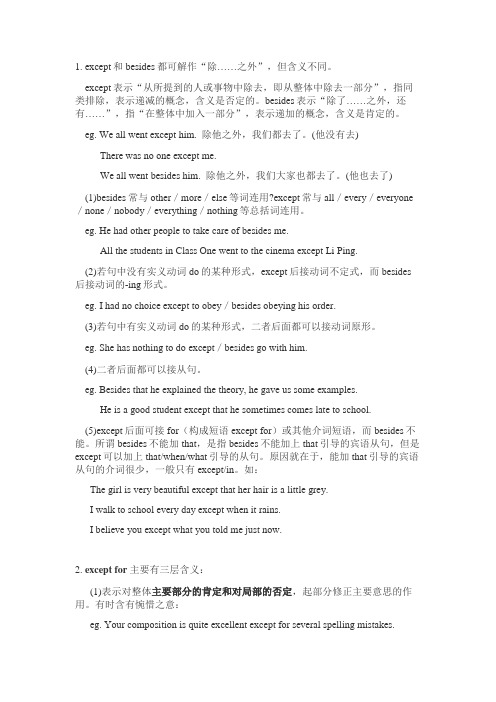
1. except和besides都可解作“除……之外”,但含义不同。
except表示“从所提到的人或事物中除去,即从整体中除去一部分”,指同类排除,表示递减的概念,含义是否定的。
besides表示“除了……之外,还有……”,指“在整体中加入一部分”,表示递加的概念,含义是肯定的。
eg. We all went except him. 除他之外,我们都去了。
(他没有去) There was no one except me.We all went besides him. 除他之外,我们大家也都去了。
(他也去了)(1)besides常与other/more/else等词连用?except常与all/every/everyone /none/nobody/everything/nothing等总括词连用。
eg. He had other people to take care of besides me.All the students in Class One went to the cinema except Li Ping.(2)若句中没有实义动词do的某种形式,except后接动词不定式,而besides 后接动词的-ing形式。
eg. I had no choice except to obey/besides obeying his order.(3)若句中有实义动词do的某种形式,二者后面都可以接动词原形。
eg. She has nothing to do except/besides go with him.(4)二者后面都可以接从句。
eg. Besides that he explained the theory, he gave us some examples.He is a good student except that he sometimes comes late to school.(5)except后面可接for(构成短语except for)或其他介词短语,而besides不能。
besides和except区别
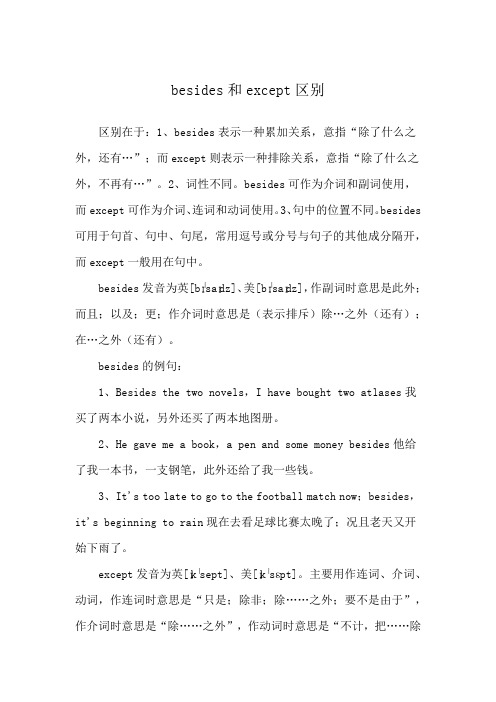
besides和except区别
区别在于:1、besides表示一种累加关系,意指“除了什么之外,还有…”;而except则表示一种排除关系,意指“除了什么之外,不再有…”。
2、词性不同。
besides可作为介词和副词使用,而except可作为介词、连词和动词使用。
3、句中的位置不同。
besides 可用于句首、句中、句尾,常用逗号或分号与句子的其他成分隔开,而except一般用在句中。
besides发音为英[bɪˈsaɪdz]、美[bɪˈsaɪdz],作副词时意思是此外;而且;以及;更;作介词时意思是(表示排斥)除…之外(还有);在…之外(还有)。
besides的例句:
1、Besides the two novels,I have bought two atlases我买了两本小说,另外还买了两本地图册。
2、He gave me a book,a pen and some money besides他给了我一本书,一支钢笔,此外还给了我一些钱。
3、It's too late to go to the football match now;besides,it's beginning to rain现在去看足球比赛太晚了;况且老天又开始下雨了。
except发音为英[ɪkˈsept]、美[ɪkˈsɛpt]。
主要用作连词、介词、动词,作连词时意思是“只是;除非;除……之外;要不是由于”,作介词时意思是“除……之外”,作动词时意思是“不计,把……除
外;反对”。
例句:We all went except him除他以外,我们都去了。
beside, besides,except, except for的区别
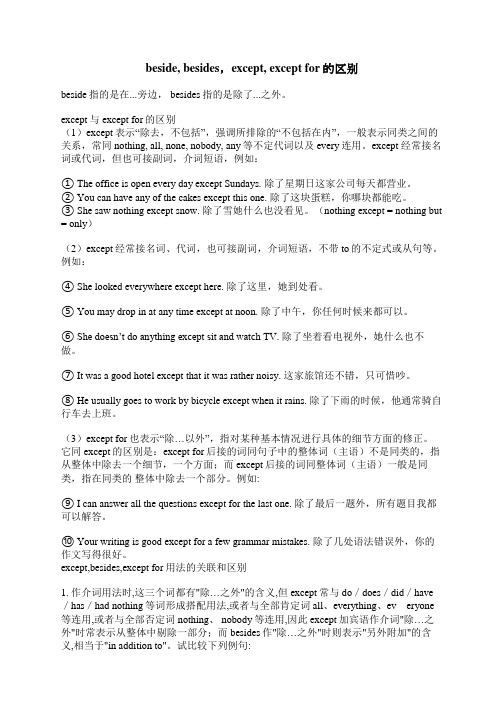
beside, besides,except, except for的区别beside指的是在...旁边, besides指的是除了...之外。
except与except for的区别(1)except表示“除去,不包括”,强调所排除的“不包括在内”,一般表示同类之间的关系,常同nothing, all, none, nobody, any等不定代词以及every连用。
except 经常接名词或代词,但也可接副词,介词短语,例如:① The office is open every day except Sundays. 除了星期日这家公司每天都营业。
② You can have any of the cakes except this one. 除了这块蛋糕,你哪块都能吃。
③ She saw nothing except snow. 除了雪她什么也没看见。
(nothing except = nothing but = only)(2)except经常接名词、代词,也可接副词,介词短语,不带to的不定式或从句等。
例如:④ She looked everywhere except here. 除了这里,她到处看。
⑤ You may drop in at any time except at noon. 除了中午,你任何时候来都可以。
⑥She doesn’t do anything except sit and watch TV. 除了坐着看电视外,她什么也不做。
⑦ It was a good hotel except that it was rather noisy. 这家旅馆还不错,只可惜吵。
⑧ He usually goes to work by bicycle except when it rains. 除了下雨的时候,他通常骑自行车去上班。
(3)except for也表示“除…以外”,指对某种基本情况进行具体的细节方面的修正。
except, except for, besides, other than, apart from
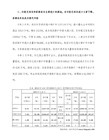
(5)except后面可接for(构成短语except for)或其他介词短语,而besides不能。
except for主要有三层含义:
① 表示对整体主要部分的肯定和对局部的否定起部分修正主要意思的作用。
Except for this everything is in order.
except for后接名(代)词可以转移为except+从句或其他介词短语。
The climate here is good except for some rainy days.(except when it rains;except that it sometimes rains;except on the rainy days)注意:二者用于否定句时含义相同,意思是一样的。
③but位置的变化会引起人称代词主、宾格的变化。
No one but I (=except me) knows it.
No one knows it but me (=except me)
4. other than含义与except/but相同,都表示从总体中除去一部分后接名词、代词或不定式。
He did nothing besides (=except) this.除这件事外,他什么事也没做。
2. apart from兼有besides和except for两种含义,后接名词、代词或动名词。
3. but含义与except相同,都表示递减的概念,二者在多数情况下可以互换,但用法稍有区别。
except, except for, besides, other than, apart from
except for与except和besides的区别

文学生活多姿多彩
except for与except和besides的区别
except for与except和besides的用法不同。
besides表示一种累加的关系,表示除了什么之外,还有……,besides后面的名词和代词之类的是包括在内。
except/except for表示的都是一种排除关系,表示除了什么之外,不再有……,它们后面的名词和代词是排除在外地不包括在内的,但是也有区别。
except 主要用来谈论同类的人或物,except for可以用来谈论不同类的事物,很少用来谈论人。
except的用法
except用作及物动词时的基本意思是“把…除外”。
引申可指“免除”,一般接人作宾语,且通常用于否定结构。
except与介词to或against连用,意为“反对…”;与介词for连用表示“不包括在…之内”。
except用作介词可表示“除…之外”,通常指所排除的事物不在所述范围之内,后面可接名词或代词。
except可接反身代词、副词、介词短语或状语从句,也可接(省略to的)动词不定式、动名词、基数词,还可接that或wh-从句。
except用作连词表示除非,除了…之外,若不是。
except for的用法
except for...是”除了因为……;要不是……;除去……一点外”的意思,表示”对一个人或事物,先做一个整体评价,然后再就局部提出一点看法”。
即一部分被肯定,另一部分被否定,这就是所谓的”排除否定式”。
其判别标志是:除去的与保留的”不是同类项”。
1。
except,except for,besides,other than,apart from几个词的区别
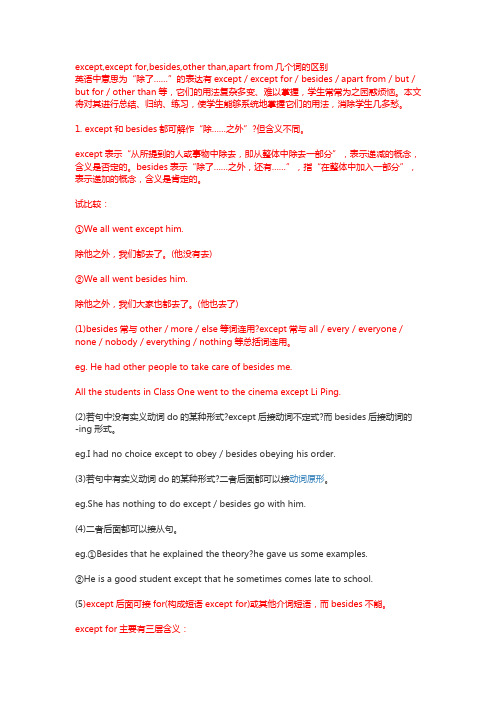
except,except for,besides,other than,apart from几个词的区别英语中意思为“除了……”的表达有except/except for/besides/apart from/but/but for/other than等,它们的用法复杂多变、难以掌握,学生常常为之困惑烦恼。
本文将对其进行总结、归纳、练习,使学生能够系统地掌握它们的用法,消除学生几多愁。
1. except和besides都可解作“除……之外”?但含义不同。
except表示“从所提到的人或事物中除去,即从整体中除去一部分”,表示递减的概念,含义是否定的。
besides表示“除了……之外,还有……”,指“在整体中加入一部分”,表示递加的概念,含义是肯定的。
试比较:①We all went except him.除他之外,我们都去了。
(他没有去)②We all went besides him.除他之外,我们大家也都去了。
(他也去了)(1)besides常与other/more/else等词连用?except常与all/every/everyone/none/nobody/everything/nothing等总括词连用。
eg. He had other people to take care of besides me.All the students in Class One went to the cinema except Li Ping.(2)若句中没有实义动词do的某种形式?except后接动词不定式?而besides后接动词的-ing形式。
eg.I had no choice except to obey/besides obeying his order.(3)若句中有实义动词do的某种形式?二者后面都可以接动词原形。
eg.She has nothing to do except/besides go with him.(4)二者后面都可以接从句。
beside besides except except for but

beside besides except except for but介绍
这些词语在英语中都是用来表示转折或排除的连词,但它们在用法上有一些细微的差别。
1. Beside:
-意义:表示位置、比较、附加。
-例句:She sat beside me during the meeting.
2. Besides:
-意义:表示除此之外、此外、而且。
-例句:Besides English, she speaks three other languages.
3. Except:
-意义:表示例外、除...之外。
-例句:Everyone passed the test except for John.
4. Except for:
-意义:与"except"类似,表示除了...之外。
-例句:All the students, except for Sarah, handed in their assignments on time.
5. But:
-意义:表示转折、但是。
-例句:The weather was cold, but we decided to go for a walk anyway.
总体而言,这些词语在使用时要根据语境来选择,以确保表达的意思准确清晰。
besides和except的区别有哪些
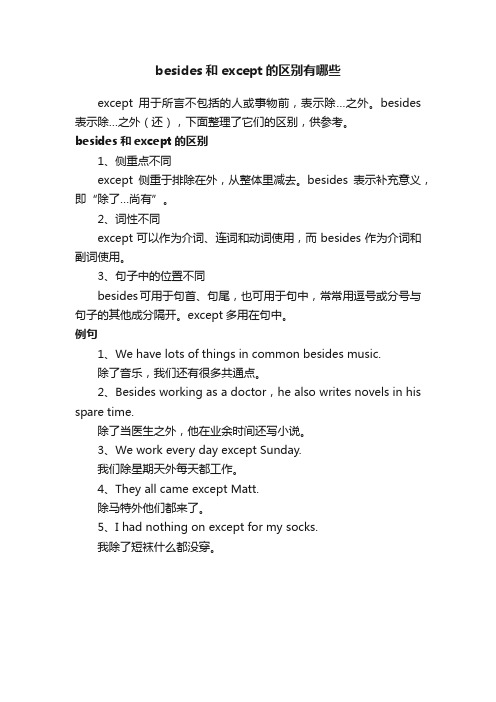
besides和except的区别有哪些
except用于所言不包括的人或事物前,表示除…之外。
besides 表示除…之外(还),下面整理了它们的区别,供参考。
besides和except的区别
1、侧重点不同
except侧重于排除在外,从整体里减去。
besides表示补充意义,即“除了…尚有”。
2、词性不同
except可以作为介词、连词和动词使用,而besides作为介词和副词使用。
3、句子中的位置不同
besides可用于句首、句尾,也可用于句中,常常用逗号或分号与句子的其他成分隔开。
except多用在句中。
例句
1、We have lots of things in common besides music.
除了音乐,我们还有很多共通点。
2、Besides working as a doctor,he also writes novels in his spare time.
除了当医生之外,他在业余时间还写小说。
3、We work every day except Sunday.
我们除星期天外每天都工作。
4、They all came except Matt.
除马特外他们都来了。
5、I had nothing on except for my socks.
我除了短袜什么都没穿。
几个“除了”之外的区别

英语中意思为“除了……”的表达有except/except for/besides/apart from/but/but for/other than等,它们的用法复杂多变、难以掌握,学生常常为之困惑烦恼。
本文将对其进行总结、归纳、练习,使学生能够系统地掌握它们的用法,消除学生几多愁。
1. except和besides都可解作“除……之外” 但含义不同。
except表示“从所提到的人或事物中除去,即从整体中除去一部分”,表示递减的概念,含义是否定的。
besides表示“除了……之外,还有……”,指“在整体中加入一部分”,表示递加的概念,含义是肯定的。
试比较:①We all went except him.除他之外,我们都去了。
(他没有去)②We all went besides him.除他之外,我们大家也都去了。
(他也去了)(1)besides常与other/more/else等词连用 except常与all/every/everyone/none/nobody/everything/nothing等总括词连用。
eg. All the students in Class One went to the cinema except Li Ping.(2)若句中没有实义动词do的某种形式 except后接动词不定式 而besides 后接动词的-ing形式。
eg.I had no choice except to obey/besides obeying his order.(3)若句中有实义动词do的某种形式 二者后面都可以接动词原形。
eg.She has nothing to do except/besides go with him.(4)二者后面都可以接从句。
eg.①Besides that he explained the theory he gave us some examples.②He is a good student except that he sometimes comes late to school.(5)except后面可接for(构成短语except for)或其他介词短语,而besides不能。
词语辨析_Besides_except_except_for_but_apart_from
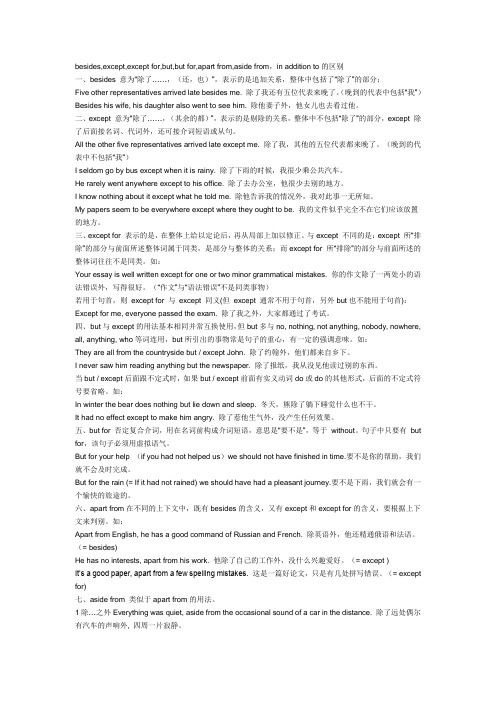
besides,except,except for,but,but for,apart from,aside from,in addition to的区别一、besides 意为“除了……,(还,也)”,表示的是追加关系,整体中包括了“除了”的部分;Five other representatives arrived late besides me. 除了我还有五位代表来晚了。
(晚到的代表中包括“我”)Besides his wife, his daughter also went to see him. 除他妻子外,他女儿也去看过他。
二、except 意为“除了……,(其余的都)”,表示的是剔除的关系,整体中不包括“除了”的部分,except 除了后面接名词、代词外,还可接介词短语或从句。
All the other five representatives arrived late except me. 除了我,其他的五位代表都来晚了。
(晚到的代表中不包括“我”)I seldom go by bus except when it is rainy. 除了下雨的时候,我很少乘公共汽车。
He rarely went anywhere except to his office. 除了去办公室,他很少去别的地方。
I know nothing about it except what he told me. 除他告诉我的情况外,我对此事一无所知。
My papers seem to be everywhere except where they ought to be. 我的文件似乎完全不在它们应该放置的地方。
三、except for 表示的是,在整体上给以定论后,再从局部上加以修正。
与except 不同的是:except 所“排除”的部分与前面所述整体词属于同类,是部分与整体的关系;而except for 所“排除”的部分与前面所述的整体词往往不是同类。
except、besides和except for等“除了”区别
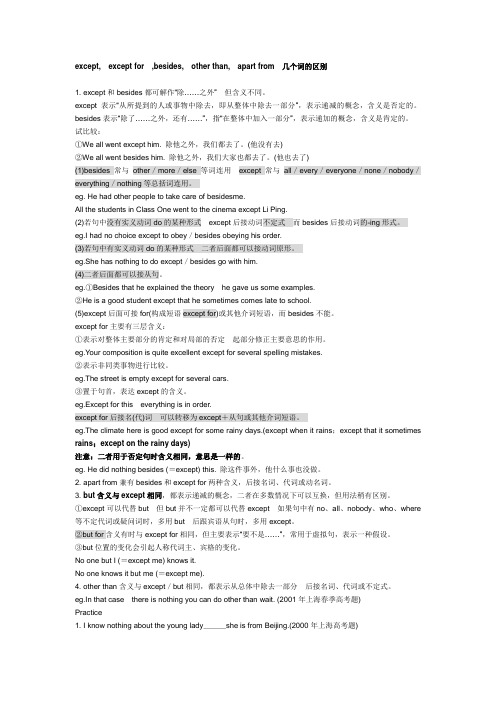
except, except for ,besides, other than, apart from 几个词的区别1. except和besides都可解作“除……之外”但含义不同。
except表示“从所提到的人或事物中除去,即从整体中除去一部分”,表示递减的概念,含义是否定的。
besides表示“除了……之外,还有……”,指“在整体中加入一部分”,表示递加的概念,含义是肯定的。
试比较:①We all went except him. 除他之外,我们都去了。
(他没有去)②We all went besides him. 除他之外,我们大家也都去了。
(他也去了)(1)besides常与other/more/else等词连用except常与all/every/everyone/none/nobody/everything/nothing等总括词连用。
eg. He had other people to take care of besidesme.All the students in Class One went to the cinema except Li Ping.(2)若句中没有实义动词do的某种形式except后接动词不定式而besides后接动词的-ing形式。
eg.I had no choice except to obey/besides obeying his order.(3)若句中有实义动词do的某种形式二者后面都可以接动词原形。
eg.She has nothing to do except/besides go with him.(4)二者后面都可以接从句。
eg.①Besides that he explained the theory he gave us some examples.②He is a good student except that he sometimes comes late to school.(5)except后面可接for(构成短语except for)或其他介词短语,而besides不能。
besides,except等词的区别

几个词组的区别(English)besides/ except/ apart from/in addition to/except for /except that/ but 的区别①.besides除……以外(还包括),例如:Who else heard of it besides you? 除了你外还有谁听说过此事。
Besides English, they also study math, physics and chemistry.除了英语以外,他们还学习数学,物理和化学。
②.except除……以外(不包括),常与all,every,no, none, nothing 等含有整体肯定或否定意义的词连用。
例如:He answered all the questions except the last one. 除了最后一个问题外,所有的问题他都回答了。
I went nowhere except to the library. 除了图书馆以外,我哪儿都没有去。
I looked everywhere except here.除了这里外,我找遍了所有地方。
③. apart from除…之外, 根据上、下文的不同,它既可用作besides, 也可用作except 和except for。
例如:Apart from them, I had no one to talk to. (= except)除了他们以外,我没有人说话。
Apart from other considerations, time is also a factor. (=besides)除了别的考虑之外,时间也是一个因素。
(It is) Good work apart from a few slight faults. (= except for)除了几个小毛病以外,这是一篇佳作。
④. in addition (to) 相当于besides.除……以外(还包括),加之。
词语辨析_Besides_except_except_for_but_apart_from

besides,except,except for,but,but for,apart from,aside from,in addition to的区别一、besides 意为“除了……,(还,也)”,表示的是追加关系,整体中包括了“除了”的部分;Five other representatives arrived late besides me. 除了我还有五位代表来晚了。
(晚到的代表中包括“我”)Besides his wife, his daughter also went to see him. 除他妻子外,他女儿也去看过他。
二、except 意为“除了……,(其余的都)”,表示的是剔除的关系,整体中不包括“除了”的部分,except 除了后面接名词、代词外,还可接介词短语或从句。
All the other five representatives arrived late except me. 除了我,其他的五位代表都来晚了。
(晚到的代表中不包括“我”)I seldom go by bus except when it is rainy. 除了下雨的时候,我很少乘公共汽车。
He rarely went anywhere except to his office. 除了去办公室,他很少去别的地方。
I know nothing about it except what he told me. 除他告诉我的情况外,我对此事一无所知。
My papers seem to be everywhere except where they ought to be. 我的文件似乎完全不在它们应该放置的地方。
三、except for 表示的是,在整体上给以定论后,再从局部上加以修正。
与except 不同的是:except 所“排除”的部分与前面所述整体词属于同类,是部分与整体的关系;而except for 所“排除”的部分与前面所述的整体词往往不是同类。
beside 和except

在写作中,"beside" 和 "except" 是两个常用的英文单词,它们在句子中起着不同的作用和意义。
在本篇文章中,我将就这两个词的用法、含义和区别展开深入探讨,以便读者能够更清晰地理解它们在语境中的运用。
1. "Beside" 的用法与含义"Beside" 是一个介词,常用来表示在某物或某人旁边的位置或状态。
在句子中,"beside" 通常与名词连用,用来表达物体在另一物体的旁边,或者人在另一人的旁边。
例如:- She sat beside her friend at the party.(她在聚会上坐在她的朋友旁边。
)- The cat slept beside the fireplace.(猫在壁炉旁边睡觉。
)2. "Except" 的用法与含义"Except" 是一个介词,常用来表示除去某事物或某人之外的情况。
在句子中,"except" 通常与名词连用,用来表达除了某种特定情况之外的其他情况。
例如:- Everyone ising to the party except John.(除了约翰,所有人都要来参加聚会。
)- I like all fruits except bananas.(我喜欢所有水果,除了香蕉。
)3. "Beside" 与 "Except" 的区别与比较要注意的是,“beside” 和“except” 在句子中的使用方式和含义是截然不同的。
"Beside" 强调的是位置、旁边的概念,表示某物或某人在另一物体或人的旁边;而 "except" 强调的是排除、例外的概念,表示除去特定情况之外的其他情况。
4. 个人观点和总结在日常生活和写作中,正确地运用 "beside" 和 "except" 是非常重要的。
besides与except区别

besides与except区别
besides与except区别在于词性不同、含义不同、用法不同。
besides作副词时意为“况且;再说;此外;以及;也”,作介词时意为“除……之外(还)”;except作动词时意为“不包括;不计;把……除外”,作连词时意为“除了;只是”,作介词时意为“(用于所言不包括的人或事物前)除……之外”。
一、词性不同besides只有两个词性,即副词、介词。
except有三个词性,即动词、连词、介词。
二、含义不同besides作副词时意为“况且;再说;此外;以及;也”,作介词时意为“除……之外(还)”。
except作动词时意为“不包括;不计;把……除外”,作连词时意为“除了;只是”,作介词时意为“(用于所言不包括的人或事物前)除……之外”。
三、用法不同1、besides用作介词的意思是“除……之外”,用在肯定句中指更进一步的拥有,即包括besides后所列的内容在内;用在否定句或疑问句中则指只有besides所包括的内容,即“除……之外(不或没有)”。
besides后除可接名词外,还可接动名词,在动词do后还可接不带to的动词不定式。
2、except用作介词可表示“除……之外”,通常指所排除的事物不在所述范围之内,后面可接名词或代词。
except可接反身代词、副词、介词短语或状语从句,也可接(省略to的)动词不定式、动名词、基数词,还可接that或wh-从句。
except, except for, apart from和besides的区别

except, except for, apart from和besides的区别
except,except for,apart from 和 besides 是表示“除…之外,但不包括…”的
副词短语,它们在英语口语和书面语中都有一定的应用。
它们之间的最明显的区别就是在
语法上的变化,具体来说,区别如下:
(1) except 和 except for 都可以用作介词和连词, except for 也可用作介词后
接名词,而 except 只能用作连词后接句子。
例如:
Everyone like him except for his sister.
除了他妹妹,所有人都喜欢他。
(2) apart from 可用作介词和连词,它可以用于句首或句中。
例如:
(3)besides,除了可用作介词和副词外,还可以用作连词,并和可数名词连用。
例如: Can you think of any other singers besides Taylor Swift?
除了泰勒·斯威夫特之外,你还能想出其他歌手吗?。
除外的英文辨析

英语中意思为“除了……”的表达有except/except for/besides/apart from/but/but for /other than等,它们的用法复杂多变、难以掌握,学生常常为之困惑烦恼。
本文将对其进行总结、归纳、练习,使学生能够系统地掌握它们的用法,消除学生几多愁。
1. except和besides都可解作“除……之外”但含义不同。
except表示“从所提到的人或事物中除去,即从整体中除去一部分”,表示递减的概念,含义是否定的。
besides表示“除了……之外,还有……”,指“在整体中加入一部分”,表示递加的概念,含义是肯定的。
试比较:①We all went except him.除他之外,我们都去了。
(他没有去)②We all went besides him.除他之外,我们大家也都去了。
(他也去了)(1)besides常与other/more/else等词连用except常与all/every/everyone/none /nobody/everything/nothing等总括词连用。
eg. He had other people to take care of besidesme.All the students in Class One went to the cinema except Li Ping.(2)若句中没有实义动词do的某种形式except后接动词不定式而besides后接动词的-ing形式。
eg.I had no choice except to obey/besides obeying his order.(3)若句中有实义动词do的某种形式二者后面都可以接动词原形。
eg.She has nothing to do except/besides go with him.(4)二者后面都可以接从句。
eg.①Besides that he explained the theory he gave us some examples.②He is a good student except that he sometimes comes late to school.(5)except后面可接for(构成短语except for)或其他介词短语,而besides不能。
- 1、下载文档前请自行甄别文档内容的完整性,平台不提供额外的编辑、内容补充、找答案等附加服务。
- 2、"仅部分预览"的文档,不可在线预览部分如存在完整性等问题,可反馈申请退款(可完整预览的文档不适用该条件!)。
- 3、如文档侵犯您的权益,请联系客服反馈,我们会尽快为您处理(人工客服工作时间:9:00-18:30)。
except和besides的区别
一、except是除去了~~~ besides是除了(包括)~~~~
举例来说除了男性还有女性(不同的类别)用EXCEPT
除了你是学生我也是学生(同类的)用BESIDES
2、except后面的东西不包括在主句所说的群体里
例如:Everyone is here except Tom.
Tom不包括在都到了的这一群体里面,因为everyone都到了,而Tom没有到,他不属于everyone这个群体了
besides后面的东西包括在主句所说的群体里
例如:Besides English, I also learn French and Japanese. English包括在我所学习的语言这一群体里面
3、except和except for的区别
except for强调的是整体和局部的差别
【例】你的作文写的不错,除了一点点拼写错误:Your competition is wonderful except for some spelling mistakes.此时要用except for而不是 except了.
4、 besides表示“除了……以外,还有……”,具有附加性质。
如:
Besides Mr Wang, we also went to see the film.(王先生也去了)
5. except表示“……除外”,具有排它性质。
如:
We all went to see the film except Mr Wang.(王先生没去)6. except for表示“除了……”,即表示除去整体中的一部分。
如:
The composition is very good except for a few spelling mistakes.。
